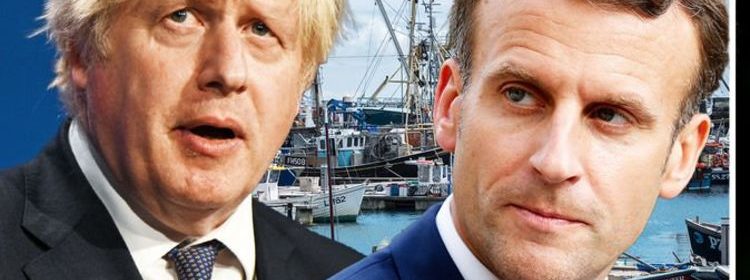‘War of attrition!’ British fishermen warn of decades of feuds with French over Brexit

Brexit: Nicki Holmyard on 'devastating' impact on fisheries
We use your sign-up to provide content in ways you’ve consented to and to improve our understanding of you. This may include adverts from us and 3rd parties based on our understanding. You can unsubscribe at any time. More info
The industry warned it expects EU-UK relations to turn “toxic” in future negotiations over access to our coastal waters. This will likely see the return of ugly scenes witnessed off Jersey earlier this year when Navy gunships had to be called in to monitor 60 French boats as they descended on the isle’s main port. The post-Brexit fisheries agreement, signed on Christmas Eve last year, deprived France, and other European countries, of a significant part of their catch.
Barrie Deas, the chief executive of the National Federation of Fishermen’s Organisations, said Brussels would use “big power politics” to win back some access.
He told a media briefing today: “My feeling is that because of the deal fishing is likely to be politically toxic between the UK and EU for decades to come.
“The UK has the legal status of a coastal state, but it’s constrained by big power politics from fully utilising those rights.”
Under the Brexit trade deal, Brussels agreed to hand back 25 percent of the value of fish caught in British waters over a five-and-half-year period.


After June 2026, the UK can slash EU catches further but eurocrats will be able to slap tariffs on fishing products or lock British boats out of the bloc as compensation.
Mr Deas said he had witnessed EU officials “crowing” over their perceived powers to maintain access to Britain’s coastal waters in the future.
And he blamed French President Emmanuel Macron for the unruly response of his trawlermen to the Brexit pact.
Mr Deas said: “French fishermen clearly were sold on the idea that the Trade and Cooperation Agreement meant no change whatsoever… that they had secured, with the help of President Macron, the status quo, and it’s not quite the status quo.”

The NFFO chief urged the Government to be steadfast in future wrangling with the bloc over fishing rights after reiterating the UK industry felt December’s agreement had been a “sell-out”.
Mr Deas argued that the weak deal struck with the EU had been interpreted by other nations as a sign Downing Street would not stand up for its fishermen.
“The turbulence that has been created has extended to our relations with Norway,” he said.
“Seeing that the UK gave into the EU, Norway is playing quite a dangerous game of hardball on Mackerel – at some cost, it has to be said, to their reputation.”
MUST READ: EU on brink as looming court showdowns could see bloc collapse

The fishing boss also spoke out over his feeling of abandonment by pro-Brexit Conservative MPs.
Mr Deas said: “Those Conservative MPs that were our most vociferous supporters were very quiet, about the implications of the TCA. That’s the world we’re having to adjust to.
“The European Research Group, for example quite often referred to fishing as a poster child for Brexit but I don’t think any of them came out and said this is a bad deal for fishing. Their eye was on the main prize, which of course was the trade agreement.”
DON’T MISS
Tory MP urges says party must change attitude towards taking the knee [REACTION]
Furious Ireland orders UK to tell them FIRST about Brexit plans [INSIGHT]
Theresa May humiliation as former leader voted joint-worst post-war PM [POLL]
Brexit: Barnier says things will be 'more difficult' for UK
He added: “It’s really quite hard to convey how sudden the industry’s fall from grace was. In December last year we were the kind of the poster child for Brexit, and we were very much looking forward to a future as an independent coastal state, with very, very solid assurances given by the Prime Minister, Lord Frost, and senior members of the of the cabinet over control over who fishes in UK waters and escape from the Common Fisheries Policy – and quota shares that reflected our new status as an independent coastal state.
“And then, from Christmas Eve, really, the Government in an eerie echo of Ted Heath’s betrayal – as it’s seen in the industry – in 1973 where fishing was sacrificed, despite all the assurances and promises. That deal was made in order to secure the broader advantages that would be attached to a trade deal with the EU.”
Source: Read Full Article
